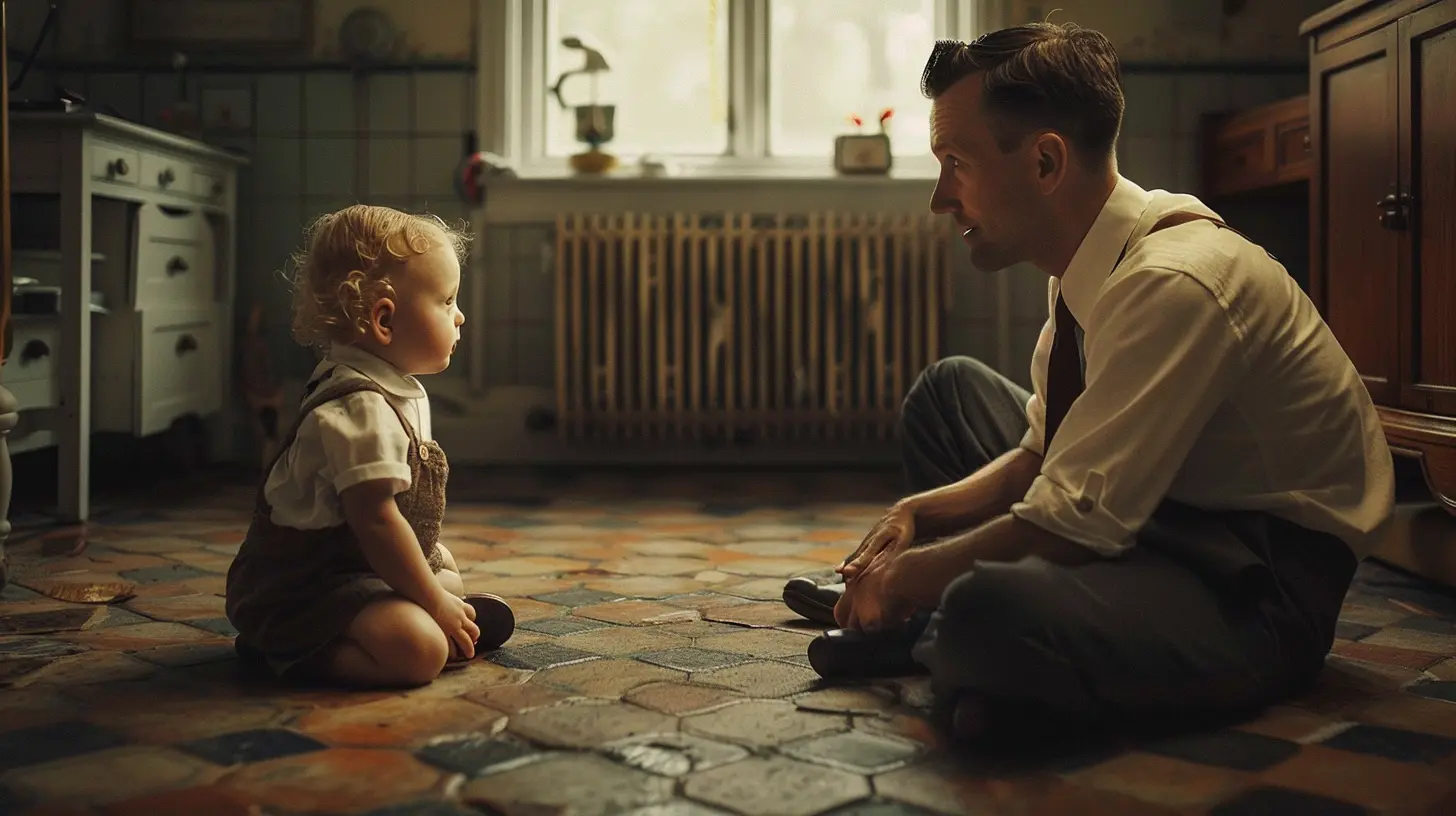How to Be a Role Model as a Father Without Being Perfect
19 November 2025
Let’s be honest—being a father is one of the most rewarding yet challenging roles a man will ever take on. From sleepless nights to temper tantrums (and not just the kids'), fatherhood is a roller coaster. But here’s the truth that nobody says out loud enough: you don’t have to be perfect to be a great dad. In fact, chasing perfection might do more harm than good. What matters most is being present, authentic, and intentional.
In this article, we're diving into how you can be a role model for your children without wearing a cape. You don't need superhero powers—your messy, flawed, trying-your-best self is enough. Let’s talk about why imperfect dads make the best role models and how you can embrace that truth.
The Myth of the Perfect Father
We’ve all seen the magazine covers, TV shows, and Instagram dads who seem like they’ve got it all figured out. Always patient, always present, always smiling. But guess what? Those guys mess up too—they just don’t post it.The idea of the "perfect parent" is not only exhausting, it's unrealistic. It sets the bar so high it's practically on another planet. And here’s the kicker: your kids don’t need perfection. They need you—in your most human, authentic form.
The Pressure is Real
Society has a funny way of expecting dads to be both the strong, stoic provider and the emotionally available nurturer. That’s like asking someone to be a robot and a teddy bear at the same time.So let’s ditch the illusion. Your mistakes don’t disqualify you. They make you relatable. Showing vulnerability as a father isn’t weak—it’s powerful.
Why Kids Need Real, Not Perfect
Children are like little sponges. They absorb the words you say, the way you act, and even how you handle your screw-ups. Ever notice how quickly your child picks up a phrase you didn’t even realize you said? Yeah, exactly.But more importantly, they learn how to approach life from watching how you navigate it.
Authenticity Teaches Resilience
You know what’s more valuable than a perfect track record? Teaching your child that it’s okay to fail. When you own your mistakes and try again, you're giving your kids permission to do the same. You're modeling resilience, and that's a life skill they’ll carry forever.Think about it—when was the last time you learned something important from doing everything right? Exactly. Growth lives in the messy parts.
Imperfection Builds Trust
When you pretend to have all the answers, you create emotional distance. But when you're honest—when you say, “Hey, I messed up, and I’m sorry”—you become approachable. Relatable. Human.Kids don’t want gods. They want guards they can trust. And trust is built not on perfection, but on consistency and vulnerability.
Practical Ways to Be a Role Model Without Being Perfect
Alright, let’s get into the how. You don’t need to overhaul your personality or become a walking self-help book. You just need a toolkit of intentional actions and mindful habits.1. Show Up, Even When It's Hard
The simple act of being present speaks volumes. Whether it’s attending a soccer game, helping with homework, or just sitting on the couch watching cartoons—your presence matters.You don't have to say the perfect thing or do everything right. Sometimes just being there is enough. Kids remember consistency more than grand gestures.
2. Apologize When You Mess Up
Let’s say you lost your cool and yelled. It happens. But the follow-up? That's what counts. Sit down with your child, look them in the eye, and say, “I’m sorry. That wasn’t okay, and I’ll try to do better.”That might feel humbling, even uncomfortable—but it teaches accountability, empathy, and emotional intelligence. You're showing them how to own their actions.
3. Admit What You Don't Know
When your child asks you a tough question—about relationships, money, or even global issues—it’s okay to say, “I don’t know, but let’s find out together.”This simple act not only models humility but also encourages curiosity and problem-solving. And it shows that learning never stops—not even for grownups.
4. Listen More Than You Speak
You don’t have to have all the answers. Sometimes, the best gift you can give your child is your undivided attention. Put the phone down, make eye contact, and truly listen.When you make space for them, you’re sending a powerful message: “What you have to say matters.”
5. Lead With Your Values, Not Your Ego
Being a role model is about showing, not telling. Talk to your kids about your values—honesty, kindness, courage—but more importantly, live them. Let them see you treat people with respect, stand up for what's right, and practice what you preach.They’re watching, even when you think they’re not.
Embracing the Journey of Growth
Parenting is a marathon, not a sprint. You’re going to have days where you feel like a superhero and others where you want to hide in the garage. That’s normal. Growth doesn’t come from perfection—it comes from persistence.It's About Progress, Not Performance
You don't wake up one day and suddenly become the ideal role model. It’s a process of trial and error, learning and unlearning. So be patient with yourself. Every step you take, no matter how small, moves you forward.Learn From Your Kids, Too
Believe it or not, your children are some of your greatest teachers. They’ll call you out, mirror your behavior, and push your buttons in ways you never imagined. But they also teach you patience, wonder, and unconditional love.Let them. Let them change you for the better.
Common Traps Dads Fall Into (And How to Avoid Them)
Let’s cover a few potholes on the road to intentional fatherhood. Knowing them ahead of time helps you steer clear.Trap 1: Thinking You Have to Fix Everything
Dads are natural problem-solvers. But not every scraped knee or broken toy needs a fix. Sometimes your child just needs a hug and a, “Man, that stinks.”Empathy can be more powerful than solutions.
Trap 2: Equating Discipline With Dominance
Discipline is about teaching, not punishing. It’s okay to be firm—but lead with understanding, not fear. Set boundaries with love, explain your reasons, and be consistent.Respect is earned, not enforced.
Trap 3: Checking Out Emotionally
It’s tempting to bury yourself in work or distractions when life gets overwhelming. But emotional availability matters just as much as physical presence. Let your kids see your joy, frustration, tears, and laughter.Be brave enough to show emotion. That’s real strength.
You Have What It Takes (Yes, You Do)
Let’s end with some honesty: you're going to mess up. Probably more than once today alone. But that doesn’t mean you’re failing—it means you’re doing the work.Your effort is the example.
Every time you try again, every time you choose presence over perfection, you're shaping how your kids will see themselves and the world. You're laying the foundation for their self-worth.
So stop waiting to be perfect before showing up fully. Your kids don’t need a flawless father. They need you—flaws, fumbles, and all.
You’ve got this.
all images in this post were generated using AI tools
Category:
FatherhoodAuthor:

Kelly Snow
Discussion
rate this article
1 comments
Craig McLoughlin
Loved this article! It’s so refreshing to see that being a great dad isn’t about perfection but showing up and being real. Thanks for the relatable tips—I can definitely use them!
November 19, 2025 at 4:39 PM

Kelly Snow
Thank you! I'm glad you found it relatable. Being present and authentic truly makes a difference in fatherhood.


